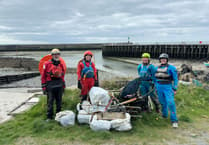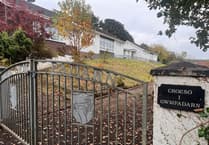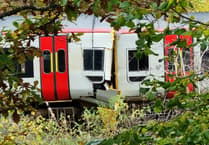THIS MONTH’s prize for an organised waste of public money goes to…the Arts Council of Wales.
The government-sponsored body, which is charged with funding and developing the arts, is doling out a hefty £25,000 to each of eight artists so they can tell the rest of us all about climate change.
That’s £200,000 of precious public funds wasted on a project that’s as superfluous as it is condescending and ill-judged.
With the planet teetering on the trembling edge of climatic and biodiversity catastrophe, the very last thing we need is more awareness-raising on a subject most people now know back to front.
Anyone still in ignorance about the multiple and dire ramifications of the blanketing of the earth with greenhouse gas emissions will have been living under a stone for the last 60-odd years. In which case they may be well advised to stay there.
As for the rest of us, stuffed with information on the rapidly unfolding threat of severe climatic disruption, the prospect of being fed more of the same could put you in mind of Monty Python’s Mr Creosote who, having grossly over-eaten, is persuaded to squeeze in a ‘wafer-thin” mint, whereupon he explodes.
Why, anyway, does the arts council, and its partners, Natural Resources Wales, feel the need to be pretentious? They say the eight funded artists - one is Heledd Wyn, a media lecturer at Aberystwyth University - will join an invention called “the Future Wales Fellowship”, and “take part in sessions with scientists and thinkers who are working to tackle climate change…”
Thinkers? So how do you get to be one of them? The arts council is determined to embarrass us with its flatulent elitism.
Awareness-raising on climate is now no more than time-wasting bystander politics, making this project a self-regarding indulgence. Right now we need just one thing - unvarnished direct action in a last-ditch attempt to head off climatic disaster and further ruination of the natural world.
It’s getting pretty darn late to rouse ourselves sufficiently. By all accounts, though, not entirely too late.
... and the biodiversity of Wales stays unfunded...
AND HERE’S the rub. While a small fortune in public cash is thrown at the arts council’s pointless enterprise, crucial work to save a precious element of Wales’s biodiversity stays unfunded.
The curlew, that beautiful and characterful wader of wet grasslands, farmland and coasts, known by its long, slender, down-curved bill and ‘cur-lee’ call, is faced with extinction as a breeding bird in Wales within 10 years. Habitat-loss and disturbance are two major threats.
The Welsh government is under international obligations to protect it and, last November, climate change minister Julie James promised funding to back vital work to halt the species’ decline. She has failed to deliver. This is disgraceful.
Mick Green, of Talybont, an ornithologist and one of Wales’s most eminent conservationists and wildlife campaigners, tells me: “We are now into the curlew breeding season with no money appearing. Another year towards extinction with no action funded.
“Although many organisations and individuals are doing what they can, the minister must live up to her pledge to make sure the action plan devised to save the curlew can be delivered.”
The government needs to be clear: it isn’t being asked for a charitable donation, it’s being pressed to fulfil duties under international and Welsh legislation. They need to get on with it.
... and £700,000 has been wasted by Ceredigion council
AND SO back to Julie James, who is making herself less than popular in local government as well. She it is who seems to have well and truly snookered Ceredigion council over its hopes for a major redevelopment of the former Arriva bus depot site in Aberystwyth.
Having paid more than £700,000 - arguably well over the odds - for the land and its now demolished garage, the council has been left high and dry after the minister vetoed a proposed Aldi supermarket and hotel because of flooding fears.
Both sites, in Park Avenue, are only yards apart, so that, unless James’s decision can be set aside, there must now be a planning presumption against building anything on the old Arriva site.
The minister’s decision is sound in principle - it’s a bad idea to hard-surface land in an area susceptible to flooding because you remove a natural soakaway. But her veto can look perverse because land surrounding the Aldi site is already almost entirely built up, and because future periodic flooding of much of the town is in any case forecast.
An excellent solution would be to create a park on the Aldi site, beautifying a generally ugly part of Aberystwyth, which anyway is very short of public green spaces.
There would remain, of course, the prospect of £700,000-plus of public money disappearing down the drain.





Comments
This article has no comments yet. Be the first to leave a comment.